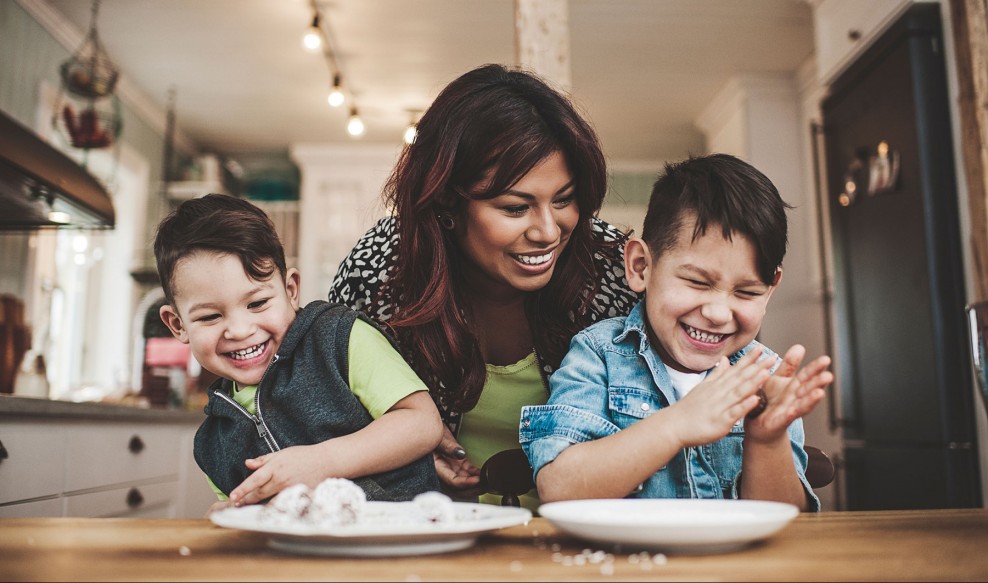Dr. Chinwe’ Williams shares more of her expert advice on conversations “What Are Your Children Thinking About COVID-19?” with Do Something Fun. Doing something fun as a family eases the stress of life during this time. Here are more ideas that create memories that make your children smile.
Stay Connected
While we understand the importance of it right now, social distancing separates us from our usual (and vital) support networks. This is problematic because we are all created to be in relationship. It’s important to balance the need for sensible precautions with the very real need for connection.
Social separation can increase your risk for loneliness. During times of uncertainty, it’s even more critical to stay connected in order to reduce some of the stress and anxiety that social distancing creates.
While we can’t socially engage in much of the same ways as we previously had, it’s important to explore creative ways to stay connected. We are now able to access a wide range of virtual events via livestreaming: virtual martial arts, yoga, virtual learning summits, and a virtual DJ dance party with 1 million of your closest friends.
Practice Worry Postponement
We as humans have the unique ability to think about future events. We can anticipate problems, and concerns, and work toward solutions to address what lies ahead. When it comes to vision casting and goal achievement, thinking ahead can be useful. However, constantly playing out the “what-ifs” of any given situation often leads to feelings of apprehension, worry, and stress. Excessive worry causes us to play out worse case scenarios and leads us to believe that we will be unable to cope.
With sheltering at home, it may be challenging to keep loneliness and excessive worry at bay. It’s important to guard not only your physical health, but also your mental health during this time.
One strategy involves postponing your worry. Worry is insistent and can make you feel that the threat is occurring right now. Practice postponing your worry. You can do this by deliberately setting aside time in your day to allow yourself time to just…yep, worry. It can be set for anytime, but try to start with 15 minutes at the end of each day. During the designated time, ask yourself if the problem is something you can actually do something about. If not, let the worry go and focus on something that is within your control. It may seem awkward at first but it does work.
Practice Gratitude
When we are under stress, the body goes in survival mode and produces stress hormones that over time can contribute to the development of stress-related illnesses such as chronic high blood pressure and cardiac problems. In addition to sleep and eating immune boosting foods, gratitude supports our immune health and helps to cultivate an overall sense of wellness.
In times of uncertainty, developing a gratitude practice helps you to notice and more easily connect to acts of kindness, feelings of joy, and moments of contentment. Ward off negative thought spirals by avoiding “what-ifs” and inserting gratitude.
If you start to feel anxiety creep in, practice this relaxation tip: Find a quiet space where you can be alone for at least 20 minutes. Turn down the lights if you like. Turn off your phone and/or computer and give yourself permission to relax. While sitting or lying down with your eyes closed, and while focusing on your breathing, take several slow deep, rhythmic breaths. Begin to reflect on a list of things for which you are grateful. Research shows that relaxing the body will relax the mind. Adding the gratitude list provides an added benefit. The more you practice relaxing your anxious mind, the more effective it becomes.
Engage in Purposeful Distractions
Find purpose by leveraging the opportunities that this novel disruption offers. Consider serving those have been particularly impacted by this crisis. Offer assistance to elderly or high-risk neighbors with picking up and delivering groceries. Volunteer to bring food to healthcare workers who are on the front lines of healing others. The lessons learned by being of service to others is invaluable.
Choose to fix your mind on creative pursuits. Engaging in creative activities eases anxiety because it gives you something enjoyable to focus on while distracting you from anything negative you might be experiencing. Learn to play a musical instrument, begin that book you’ve wanted to write, or reproduce that cool thing you found on Pinterest. Even if you do not initially succeed, there’s time to try again.
Finally…
We are in an unsettling time. The uncertainty about what lies ahead can fuel anxiety. Be patient with yourself. Reach out to others. Stay calm and stay safe. This too shall pass.
Chinwé Williams, PhD is a Board-Certified and Licensed Professional Counselor (LPC) in the state of Georgia. She has served as a counselor educator, supervisor, and an executive coach. Her expertise lies in the areas of trauma recovery, enhancing resilience, and wellness. She has taught at Georgia State University, University of Central Florida, and Rollins College. Dr. Chinwé currently speaks and writes in the areas of stress and anxiety management and wellness. https://meaningfulsolutionscounseling.com/
Dr. Chinwe’ Williams is also a featured contributor for Parent Cue. Head over to Parent Cue to read more of her insights. Follow on Twitter @drcuwilliams



